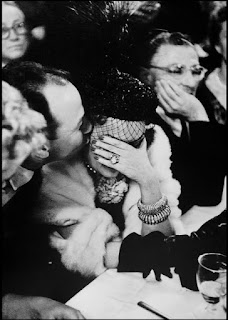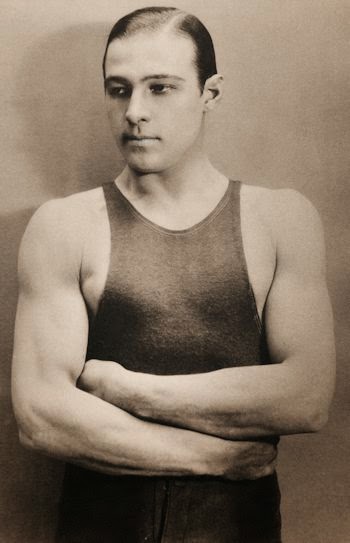Mary Astor a Different Norma Desmond
Sunset Blvd. is one of the most revered films of the 20th
century. It is hard to believe that this
was not always the case. When the film
was in production there were plenty of people who were not happy about the
tenor and tone of the script. Writers Charles
Brackett and Billy Wilder apparently got around some of the objections
anticipated from the Breen Office by submitting portions of the script a page
at a time. Once production had been
completed. There were plenty of howls
after the film had been screened. The
dark, gritty underbelly of the industry had been there from the very beginning. That underbelly was just not something
brought up in polite conversation. It
was the equivalent of biting the hand that fed you, so to speak. Silent siren of the “bee-stung-lips,” Mae
Murray, was purported to exclaim after seeing the film, “None of us floozies
was that nuts.”
The role
ultimately went to Gloria Swanson who turned in a performance that was both
heartbreaking and scary. Her Norma
Desmond is a towering achievement. It’s
quite operatic and it is absolutely iconic. I’m not going to do a detailed examination of
the Wilder film, but you’ll find a great take on it here at my pal TinkyWeisblat’s place for the Film Noir Blogathon. Goodness
knows, plenty of people have examined this wonderful film. Forget the analysis, just see it if you have not.
Swanson richly
deserved the Academy Award nomination for the tour de force performance. She
also deserved to win the award, too. Her
competition for the Oscar was pretty darn stiff: Bette Davis and Anne Baxter (both for their
roles in All About Eve), Judy Holiday
(Born Yesterday) and Eleanor Parker (Caged).
In the end, Judy Holiday won for her portrayal of Billie Dawn for which
she was brilliant. In my heart, even
though I was not alive at the time, I’m still bitter that Swanson was denied
the ultimate award. As an aside, Swanson, was nominated for an Academy Award
three times and was a three time loser, in 1927/28 (the first awards) for Sadie Thompson (for which she received a
certificate of honorable mention), in 1929/30 for The Trespasser, and in 1950 for Sunset
Blvd. Sadly, she never received even
a lifetime achievement nod from the Academy.
 |
(Bert Glinn, Magnum photos) |
Sunset Blvd. the musical production was a huge success for
Glenn Close and those that followed as Norma Desmond on stage. I’ve never seen it and can’t possible comment
to paraphrase Frances Urquart.
This brings us to
the point of today’s posting and a much more obscure version of Sunset Blvd. Telecast live on December
3, 1956 The Robert Montgomery Theater presented a version of Sunset Blvd. starring Mary Astor as
Norma, Darren McGavin as Joe and Gloria de Haven as Betty Schaffer. Because I adore Mary Astor and Sunset Blvd., I was very curious to see
this and thankfully the film has been preserved. It’s available thanks to reelclassicdvd.com for
insanely curious people like me. As a
fan of Mary Astor and of Darren McGavin this was must see TV for me.
 |
| Mary Astor and John Barrymore from the 1924 film Beau Brummel |
The average movie
fan might be unaware or forget that Mary Astor was a silent film star of some
note. Astor is so identified with her
many excellent performances in the 1930s, 1940s and 1950s people forget she
began in bit parts in 1921 and soon made it big in the 1924 film Beau Brummel with John Barrymore (her acting
mentor and romantic paramour). Astor
went on to star with Douglas Fairbanks Sr. (Don
Q Son of Zorro), John Barrymore (Don
Juan utilizing the new Vitaphone synchronized soundtrack). Rightly so, Astor is better known for her
work in the sound era in films such as Dodsworth,
The Prisoner of Zenda, The Palm Beach Story, The Maltese Falcon, Meet Me in St. Louis
and for her Best Supporting Academy Award in The Great Lie. Astor was
nothing if not a trouper, playing femme fatales, fallen women, smart women,
rich women, tough dames, warm and supportive mothers (or girlfriends) and
killers with aplomb. Her distinctive, throaty
and warm voice along with her mellifluous delivery made her a natural for the
sound stages and she had style. Astor, I
think it’s safe to say was relaxed in front of the camera, her confidence
showed in comedy and drama. Therefore,
the casting of Mary Astor as silent screen goddess Norma Desmond is no real
stretch.
 |
| Screen Grab from reelclassicdvd.com |
The teleplay is
introduced by host Robert Montgomery who sets up the story, much like the film
Joe Gillis does. We miss the opening
sequences from the film and dive right in with Joe arriving at Norma’s house
and being mistaken as the undertaker for Norma’s pet monkey. Watching this you have to just forget the
film, this is early TV, the sets are cheap and sparse (though I was impressed
with the set that had the pool). He
enters the mansion and instead of being treated to “Norma Desmond everywhere”
there are only a couple of really beautiful vintage portraits of Astor from the
1930s on display.
The hour passes
quickly, it’s like a “Cliff-Notes” version of Sunset Blvd. with many scenes
that seem to integral to the film, on the cutting room floor, so to speak. Obviously, in the teleplay setting, there is
no Isotta-Fraschini to be seen. Again, I
was impressed they managed a serviceable pool.
Cecil B. DeMille, Sheldrake and Joe’s agent were all rolled into the one
producer. There are no real exteriors and one set with moveable walls acts as the Sunset Blvd. mansion.
Astor is rather
understated as Norma and while they did have rehearsals, this was live
television and her nerves show a little bit.
The lights were hot, her makeup not too flattering which lends to the
illusion of Norma being older than in her heyday. It’s impossible for anyone to think this
modest production would have erased Gloria Swanson, it did not and could not. To her
credit, Astor did not attempt an imitation, she made Norma her own creation.
Her Norma is not the operatic tragedy, but a sad, not terribly reflective Norma, who is not entirely unaware that Salome might be a somewhat gritty end to
a golden career. The lack of opulence in
the sets of Norma’s house adds to the threadbare life you imagine this Norma
Desmond to lead. She writes her Salome
script endlessly and is tended for all her other needs by the devoted Max (Walter
Kohler). She has money, but, she's not keeping up appearences. In the end, it’s not the gut wrenching
sadness you feel as her Norma descends the stairs, either.
Also, the Joe
Gillis of Darren McGavin is not the snide, cynical Joe of William Holden. He first recognizes Norma with the right
note, a little awe, a little bit impressed and with some genuine respect. He finds himself trapped by being the kept
man, but he does not seem to be quite as bitter or confined as Holden’s
Joe. Not, at least, until he meets Betty
Schaffer (Gloria de Haven). I did not
see any real chemistry between McGavin and de Haven, both were a little too
long in the tooth to portray the youngsters of new Hollywood.
 |
| Darren McGavin and Mary Astor rehearsing Sunset Blvd. (Darren McGavin Tribute Pages) |
In the end, while
it was interesting to watch I came away feeling like I’d missed something, and
I had. The Wilder film is so ingrained, so well
loved and well known to me, it’s hard to overcome what really was a cheap
knockoff. I had hoped that Mary Astor
would really have cut loose as Norma, but, in the end I was glad she did it her
own way, a quieter Norma. This is worth
viewing as a curiosity and it reminds me, Mary Astor really does deserve a
closer look, and fresh examination by an author. In thinking here of her body of work, she
really was quite fabulous.
This is my
belated birthday post and belated promised post for the Mary Astor
Blogathon. Initially I was going to post
about her book A Life on Film. I may still do that, but this was so much
more interesting.



Comments
It does nothing to erase the memory of Swanson's Norma, but it is quite interesting as an exercise. A very great actress (Astor) straying into someone else's territory. For that, I think it is a must see for both Astor AND Sunset Boulevard fans.
I saw the Broadway Sunset Boulevard with Betty Buckley rather than Glenn Close. I imagine the overall effect was similar. Betty a better singer, but perhaps less an actress, but still a formidable Norma. But the musical itself is more a musical simulacrum of the story, rather than compelling in its own right.
Vienna's Classic Hollywood